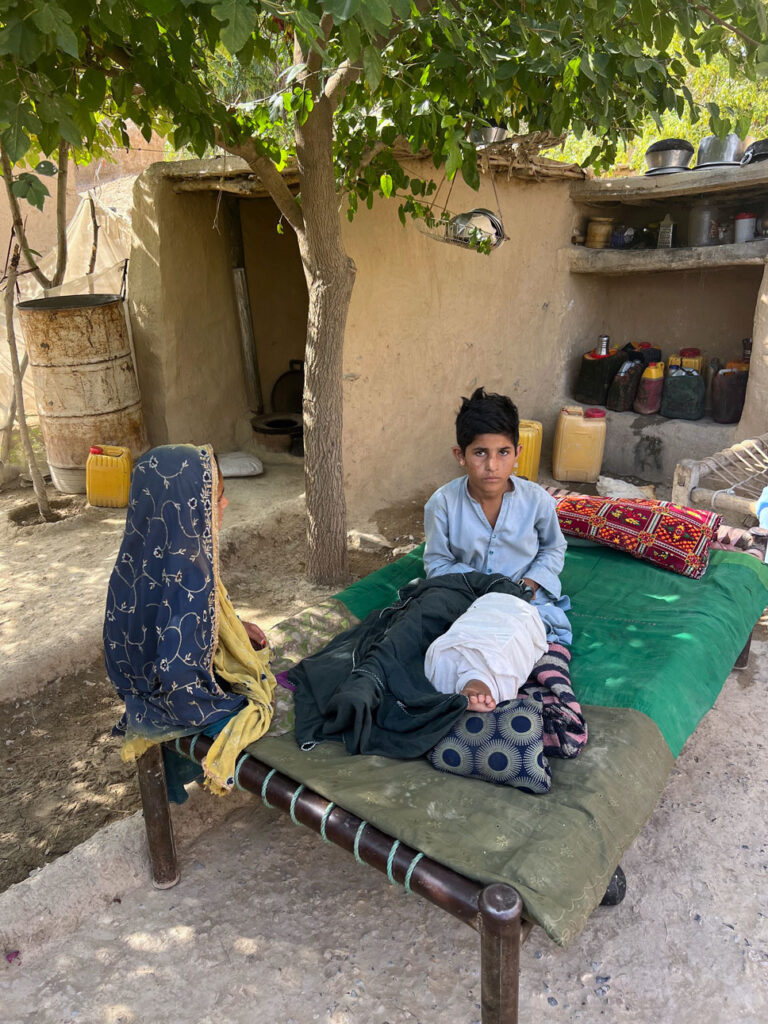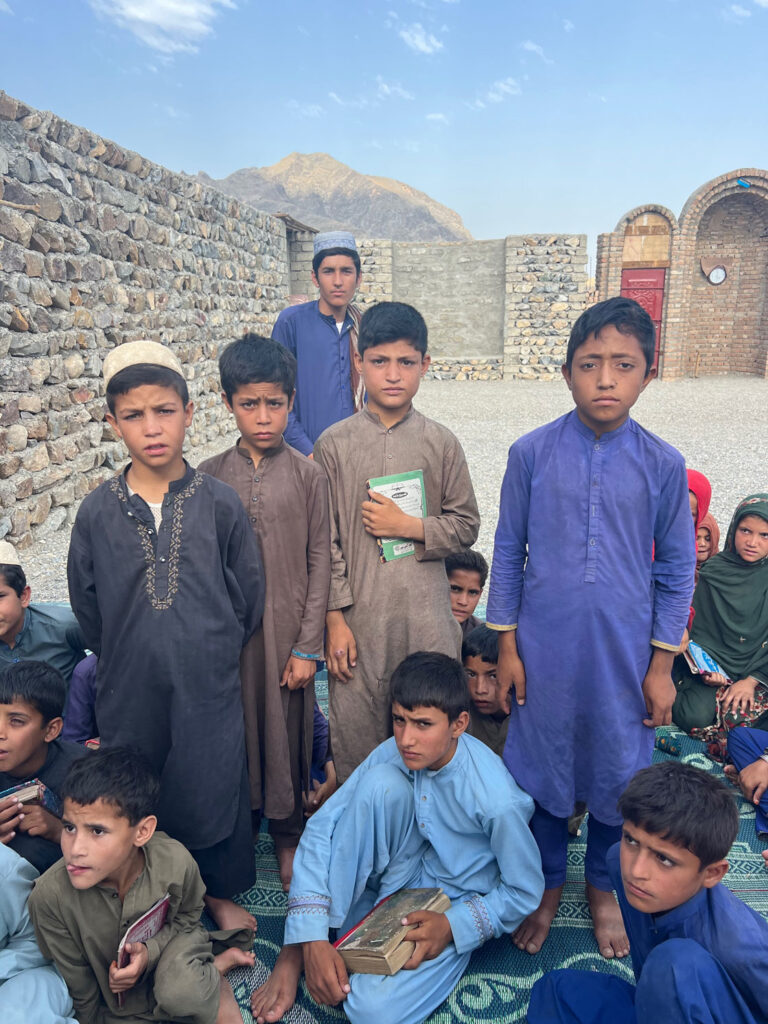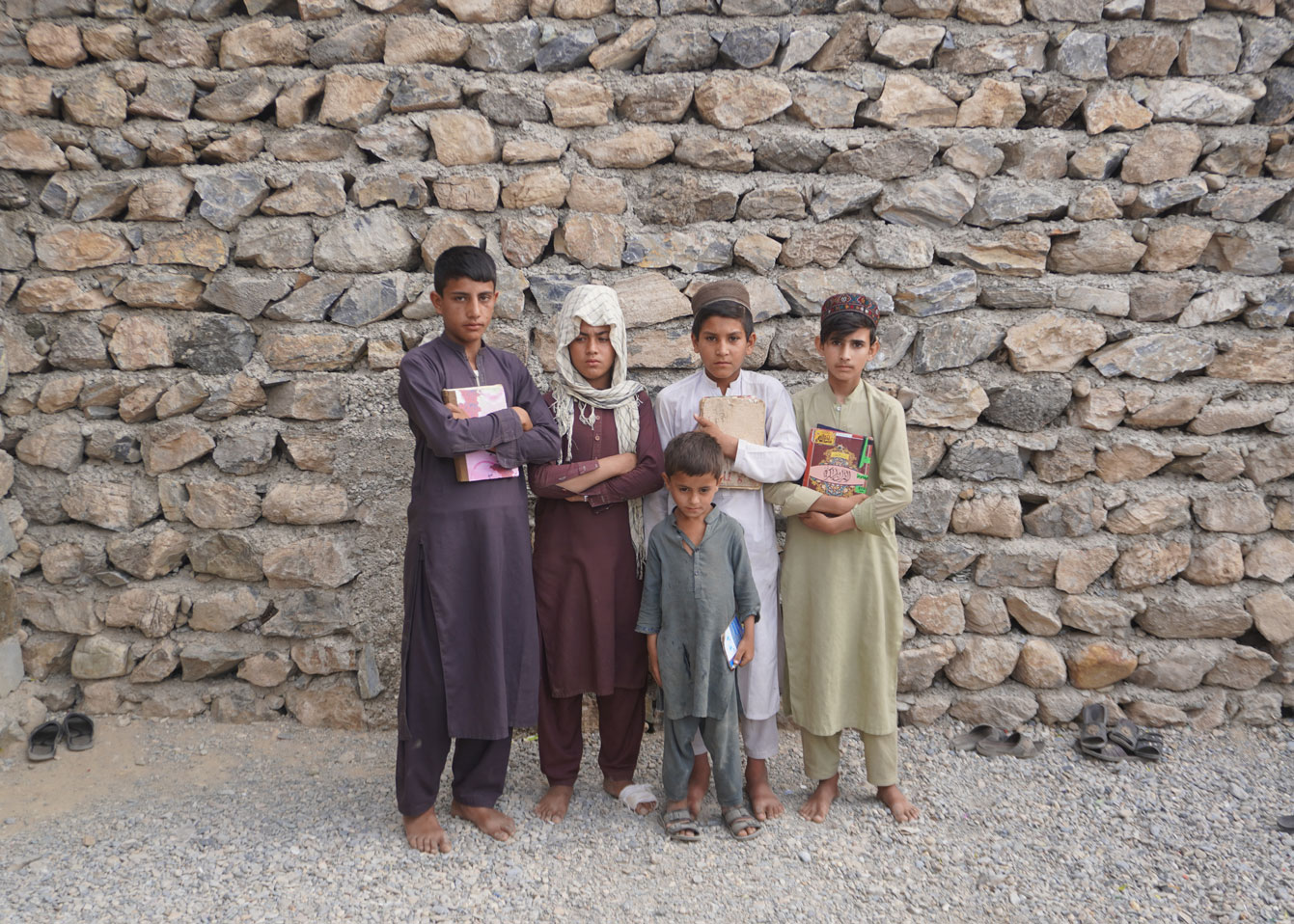Zar Alam, 12, sits upright on a cot in the shade of a tree as some chickens scurry around. He has chocolate-brown hair and pensive eyes. His slightly pigmented skin bears marks of exposure to the harsh elements. One of his scrawny legs is bandaged and encased in a wooden cast. “A khasadar (Pakistani militiaman) was chasing me when I fell and a truck passed over me,” he says, his voice a whisper. He was smuggling sugar from Pakistan to Afghanistan for a slim profit, to support his poverty-stricken family in Torkham, a border town located in Afghanistan’s eastern Nangarhar province.
“We weren’t aware that he was going,” says his father, surrounded by Zar Alam’s young siblings. “His mother wasn’t aware. We were all at work.” A stranger found him injured on the highway and took him to a local clinic in Pakistan, before he was transferred to a hospital in Peshawar, the capital of Pakistan’s Khyber Pakhtunkhwa province. Too poor to afford a passport, his father was unable to cross the border to retrieve his injured son. He called a cousin in Pakistan to visit the hospital instead. For 20 days, Zar Alam couldn’t move as doctors salvaged his crushed leg. One year on, he still cannot walk. He now spends his days at home reading and memorizing the Quran. Going to school and learning English are distant memories.

Zar Alam’s story is not uncommon. Many boys in the villages surrounding Torkham have been chased and abused by Pakistani security forces while attempting to smuggle goods across the border. They hide under trucks to make the illegal crossing. Born of poverty, the practice is known in Pashto as carrying “gandey” — meaning the sacks the children strap to themselves to move items such as sugar and tea from Pakistan to Afghanistan. They also carry metal parts, electronics and expired materials from Afghanistan to Pakistan for resale. UNICEF reports that over 2,500 children are engaged in the trade at the Torkham border. Pakistani authorities intercept the children, confiscate their bags and often beat them, while the children plead for their sacks to be returned, recounting their misfortunes.
On a summer day, we set out from Jalalabad on Highway 1, across undulating hills to the Afghan side of Torkham. Thousands of Afghans cross the border here daily. During the Soviet occupation of the 1980s, over 3.5 million Afghans fled across to Pakistan. It remains an important trade route today, with colorfully painted trucks queuing on both sides to be cleared by customs authorities.
We exit the highway and drive along a dirt road, passing a small cemetery where goats graze and a small girl with henna-colored hair waves at passing cars. We arrive at Madrasa Darul-Ahnaf, an open-air seminary where over 50 boys sit cross-legged on carpets on the dirt floor. They rise each day at 4 a.m. and walk on empty stomachs for an hour to reach the mud-brick school, which has no furniture or windows. They’ve been here since 5:45 a.m.
“We lack the capacity to teach modern subjects,” says Mawlawi Esmatullah Shinwari, the deputy governor of Torkham’s Momand Dara district. “A child has to walk a long distance to reach the school and by the time he reaches the school, he is already exhausted.” The condition of the school reflects the dire poverty that is forcing other children to risk their lives to carry gandey. The children have little to look forward to.
Some madrasa students are victims of forced displacement. Dressed in an aubergine-colored shalwar kameez, 15-year-old Mohammed Zia recalls how, in 2014, his family, including his three younger brothers and three sisters, fled from the Islamic State group, who had taken over the Wazir valley in the nearby Khogyani district.
“When the fighting started, we escaped and hid for 10 days. Our house was destroyed,” he says. When he is not at school, he spends his time cleaning metal parts for trucks every day for about $1, while dreaming of becoming a teacher.

Poverty and lack of educational infrastructure represent major challenges in Torkham. Shinwari claims that Afghanistan has “improved economically” since the Taliban returned to power two years ago and that local teachers are being paid from local taxes. According to a May 2023 World Bank report, “Revenue collection during the first two months of fiscal year 2023 is healthy” and has improved by 22% compared to the same period in 2022, while “civil servants’ salaries continue to be paid on time.” But if there has been economic improvement, it has yet to trickle down to families like Zar Alam’s and Mohammed Zia’s. Meanwhile, the schools offer sanctuary and basic literacy only to those children who are lucky enough to have someone else providing for their families.
Holding a tattered schoolbook, 12-year-old Lalzaib stares at the ground as he speaks. Like Mohammed Zia, his family fled from a nearby district — Achin, where the Islamic State’s branch in Central and South Asia remains at war with rival insurgents. For the past two months, he has been carrying gandey back and forth but has now stopped and instead come to school.
“My father went to Iran to work as a laborer,” he explains. Lalzaib’s father is among the many who have had to migrate to neighboring Iran, often illegally, to work in blue-collar jobs with the risk of arrest and deportation constantly hanging over them.
On the outskirts of the western Afghan city of Herat, weathered steel cargo containers lie in yards as large lorries prepare to transport goods through Islam Qala, an Afghan town bordering Dougharoun in Iran’s Mashhad province. Nearly 80 miles separate Islam Qala from Herat. Dotted with sporadic mud homes and settlements, the stretch of road is dominated by the Surkh-Salman Mountains. Every day, thousands of Afghans travel this route into Iran, in the hope of finding work and remitting money to their families in Afghanistan. Its harsh environment foreshadows the hardships that lie ahead for them. As in Torkham, the migrants are carried forth by the dream of finding a way out of poverty. Many such dreams quickly dissipate at Zeropoint, a reception center at the border, where large numbers are turned back by Iranian officials or forcibly deported. In 2022, the United Nations High Commissioner for Refugees (UNHCR) reported that 485,000 undocumented Afghans had been deported back to Islam Qala and Zaranj (a border crossing in the country’s southwest).
A strong wind blasts across Zeropoint’s large entrance and Afghans drag their few belongings through the dirt as they return from Iran. Here, hundreds of Afghans are processed daily upon arrival. Many stakeholders, including UNHCR, the International Organization for Migration, Save the Children, the Norwegian Refugee Council and the World Health Organization, are also present here. The mammoth structure was erected by the Norwegian Refugee Council in 2019 to cater to the large numbers of deportees. It remains a hive of activity, with people registered, processed or assessed for medical care. The NGOs help transport deportees back to their places of origin.
The Taliban government’s commissioner for refugee affairs at Islam Qala, Abdullah Qayoumi, has heard numerous stories of mistreatment by Iranian authorities from returning Afghans. According to UNHCR, deportees from Iran have been poorly treated by police, subjected to physical violence and forced to pay for their transportation, accommodation, and food, while those who could not pay were detained until able to do so. Throughout June 2023, deportees have numbered thousands each week. Over five days in mid-June, there were close to 4,000 deportees; almost 100 unaccompanied minors also arrived over a five-day period.
One of them is Abdul Mutalib. Dressed in black tracksuit pants and sneakers, the 14-year-old has never been to school and has spent his brief life supporting his family of six younger brothers and three sisters. A couple of years ago, he left his home in the Sholgar district near Mazar-e Sharif, in northern Afghanistan, to enter Iran illegally. For 18 months, he worked in a steel factory, burdened with guilt over his mother’s distress at his going abroad. Abdul Mutalib was arrested along with his uncle one day when they visited a market to buy food.
“They kept us for four days in a camp,” he says. “They wouldn’t give us enough food. They only fed us enough to keep us alive.” Earlier, Abdul Mutalib’s father had also been deported from Iran. Despite the family’s privations, Abdul Mutalib isn’t eager to return to Iran. Like other impoverished Afghans, he now joins wage laborers at the local square from 6 a.m. in the hope of finding work. The rigors of his life leave him no prospect of obtaining an education.
Abdul Bashir, 19, tells a similar story. He left his home in Baghlan, a province north of Kabul, with the little money he had, looking to find work in Iran along with a group of other boys. Within two days of his arrival, he was caught by the Iranian police and deported.
“I finished my money,” he says, his eyes glazed over with exhaustion. “I only have 100 tomans (worth less than a penny). I don’t know what will happen to me.”
Meanwhile, the Afghan capital of Kabul still heaves with traffic and dust, though roadsides are no longer littered with trash. Municipal workers keep the streets clean, but even more noticeable is the reduced presence of street kids. For many years, groups of young children would knock on car windows in traffic jams to beg for money. Since the middle of August last year, in an attempt to deliver social services to the needy, the Taliban have been rounding up beggars, including children in Kabul and other major cities.
“So far over 3,000 beggars were collected from Kabul’s streets,” claims Abdullah Azzam, the deputy prime minister’s secretary. The children are screened and, where appropriate, given some financial support and referred to charities, he says. Young men who are eligible for work are directed to a professional institute for skills training and to search for a job. “If they are arrested doing this a second time, they will be sentenced to three days jail,” Azzam says.
According to the U.N., about 47% of Afghanistan’s 41 million people are under the age of 15. Over 15 million children are in need of humanitarian aid, half of them girls who are excluded from secondary education and above. Afghanistan’s population is still growing at a rate of 2.3% annually. While today’s Afghan kids aren’t growing up in the shadows of war, if things do not change, future generations will grow up in a country where resources are scarcer and prospects slimmer. Without nationwide modern education to promise social mobility, many Afghan children like Zar Alam find themselves left with the misfortune of having to risk life and limb at the border.
Sign up to our mailing list to receive our stories in your inbox.




